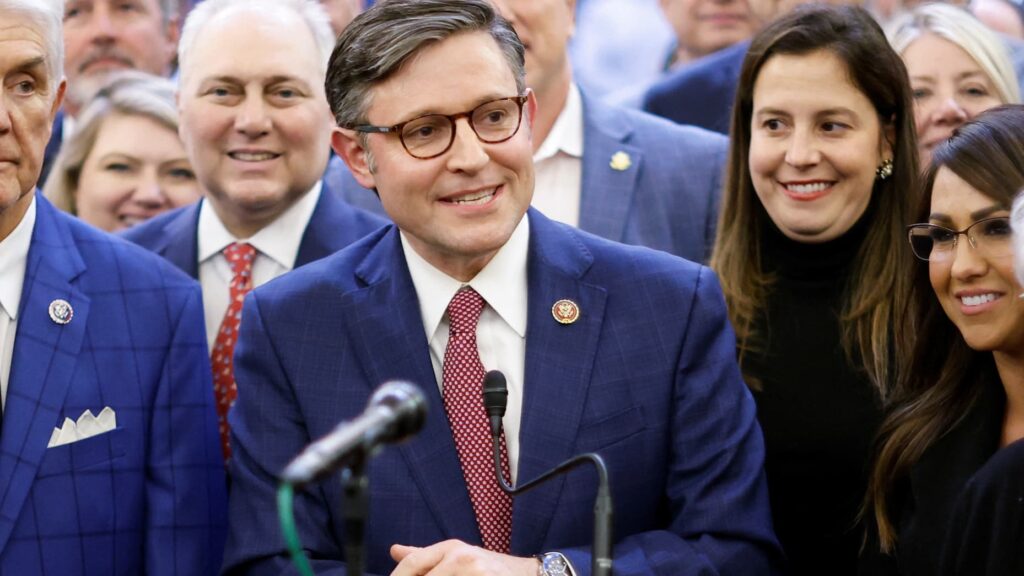House Republicans are scheduled to elect a leadership team Wednesday that is expected to be little changed from their current one — thanks to the Trump-powered GOP sweep that appears likely to keep them in charge of the House for another two years.
Republicans are expected to nominate Speaker Mike Johnson, R-La., an ally of President-elect Donald Trump, to continue in the top job in the 119th Congress. Johnson and his fellow Republicans have declared victory in last week’s House elections, though several competitive races remain outstanding and NBC News has yet not projected which party will control the chamber.
Johnson will need to win over just half of his conference Wednesday, an easy hurdle after Republicans performed well in the elections. But he could face a symbolic challenge in the closed-door election. Rep. Andy Harris, R-Md., the new chairman of the hard-right House Freedom Caucus, said it is unclear whether the group will nominate someone to run against Johnson, adding that “having two people in a race is kind of the norm” in America.
To secure his first full term in the job, Johnson will still need to win 218 votes — a simple majority of the 435 total House seats — in a public floor vote in January. Because of the GOP’s tight margins, a handful of rank-and-file Republicans could team with Democrats to block Johnson, but it would be highly unusual after the party’s election performance.
Trump plans to meet with House Republicans before their leadership elections Wednesday morning, several lawmakers said. An adviser to Trump said that Elon Musk would join the president-elect for the meeting. Musk has spent the last week in Palm Beach with Trump.
Johnson told reporters Tuesday he was confident he would win the speaker’s gavel on the first ballot on Jan. 3 — unlike two years ago, when it took GOP leader Kevin McCarthy, R-Calif., 15 ballots and five days to win the gavel after he faced opposition from his right flank. McCarthy was ousted as speaker just nine months later, paving the way for Johnson.
“Everybody has ideas on how to better improve our processes. And some of the frustrations that we had over the last year with the smallest margin in history, with control of only one-half of one-third of the federal government, will not be our concerns going forward because we have unified government,” Johnson said.
“Everybody’s going to want to be on the team to run the reform agenda that the American people desperately need and deserve. … So I think you’ll have total unity in the party, I really do,” he continued.
Multiple Johnson allies warned their GOP colleagues not to play games with the Jan. 3 speaker election once Johnson wins his party’s nomination Wednesday.
“I hope we don’t put on a s— show on Jan. 3,” said Rep. Scott DesJarlais, R-Tenn., a Freedom Caucus member who is backing Johnson.
Also Wednesday, Johnson’s top two lieutenants — Majority Leader Steve Scalise, R-La., and Majority Whip Tom Emmer, R-Minn. — are on track to win re-election to the No. 2 and No. 3 jobs. As of Tuesday night, they were running unopposed.
Across the Capitol, Senate Republicans are expected to elect a successor to Republican leader Mitch McConnell of Kentucky, who is stepping down after 18 years leading the GOP conference.
The only other competitive high-profile House Republican leadership race is the one to replace outgoing GOP Conference Chair Elise Stefanik of New York, the No. 4 leader, whom Trump said he will nominate to be the U.S. ambassador to the United Nations.
While the top tier of House Republican leadership has long been dominated by white men, the conference chair position has been held by a woman for the last decade. Rep. Lisa McClain of Michigan, who is on Johnson’s leadership team as GOP conference secretary, is running for the No. 4 position against Rep. Kat Cammack of Florida, who has endorsements from Sens. Rand Paul, R-Ky., Rick Scott, R-Fla., and other conservatives.
After a successful election cycle, Rep. Richard Hudson of North Carolina is running for a second term as chairman of the National Republican Congressional Committee, the House GOP’s campaign arm. And Rep. Blake Moore of Utah, who succeeded Johnson last year as vice chair of the GOP conference after Johnson ascended to the speakership, said he will run for a second term in the No. 6 job after he briefly flirted with a bid for conference chair.
Conservative Rep. Gary Palmer of Alabama, the GOP policy chairman, faces a challenge from Rep. Kevin Hern of Oklahoma, who this cycle led the 177-member Republican Study Committee, the largest caucus of conservatives on Capitol Hill. There is also a competitive race for GOP conference secretary.
The GOP leadership team will play a significant role in trying to advance Trump’s legislative agenda next year.
Johnson, who said he will be with Trump at Mar-a-Lago, his home in Florida, this weekend to “iron out details” of their strategy, said Republicans have spent the past year discussing how they could use budget “reconciliation” — an arcane legislative tool that allows the majority party to sidestep filibusters and push through legislation with 51 votes — if they win control of Congress and the White House.
He conceded that the last time Republicans had unified control of government, in 2017 after Trump’s first victory, “the Republican Party was not fully prepared for that moment, and precious time was wasted at the beginning of that Congress.”
“We are not going to make those mistakes again,” said Johnson, who was a newly elected freshman lawmaker that year. “We will be ready on Day One. We are prepared this time. And as we wind down, the 118th Congress will be ready to take the ball and run full speed in the 119th Congress that begins in January.”
